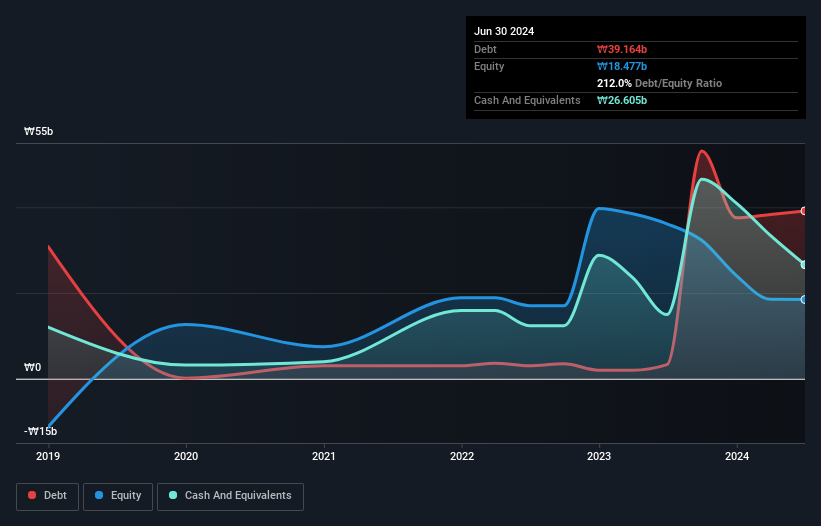Howard Marks put it nicely when he said that, rather than worrying about share price volatility, 'The possibility of permanent loss is the risk I worry about... and every practical investor I know worries about.' So it seems the smart money knows that debt - which is usually involved in bankruptcies - is a very important factor, when you assess how risky a company is. As with many other companies Neuromeka Co., Ltd. (KOSDAQ:348340) makes use of debt. But should shareholders be worried about its use of debt?
Why Does Debt Bring Risk?
Generally speaking, debt only becomes a real problem when a company can't easily pay it off, either by raising capital or with its own cash flow. In the worst case scenario, a company can go bankrupt if it cannot pay its creditors. While that is not too common, we often do see indebted companies permanently diluting shareholders because lenders force them to raise capital at a distressed price. Having said that, the most common situation is where a company manages its debt reasonably well - and to its own advantage. When we think about a company's use of debt, we first look at cash and debt together.
View our latest analysis for Neuromeka
How Much Debt Does Neuromeka Carry?
The image below, which you can click on for greater detail, shows that at June 2024 Neuromeka had debt of ₩39.2b, up from ₩3.30b in one year. However, because it has a cash reserve of ₩26.6b, its net debt is less, at about ₩12.6b.

How Strong Is Neuromeka's Balance Sheet?
The latest balance sheet data shows that Neuromeka had liabilities of ₩50.8b due within a year, and liabilities of ₩20.4b falling due after that. Offsetting these obligations, it had cash of ₩26.6b as well as receivables valued at ₩11.9b due within 12 months. So it has liabilities totalling ₩32.6b more than its cash and near-term receivables, combined.
Since publicly traded Neuromeka shares are worth a total of ₩192.8b, it seems unlikely that this level of liabilities would be a major threat. But there are sufficient liabilities that we would certainly recommend shareholders continue to monitor the balance sheet, going forward. When analysing debt levels, the balance sheet is the obvious place to start. But it is future earnings, more than anything, that will determine Neuromeka's ability to maintain a healthy balance sheet going forward. So if you want to see what the professionals think, you might find this free report on analyst profit forecasts to be interesting.
In the last year Neuromeka wasn't profitable at an EBIT level, but managed to grow its revenue by 125%, to ₩21b. So its pretty obvious shareholders are hoping for more growth!
Caveat Emptor
While we can certainly appreciate Neuromeka's revenue growth, its earnings before interest and tax (EBIT) loss is not ideal. Its EBIT loss was a whopping ₩20b. Considering that alongside the liabilities mentioned above does not give us much confidence that company should be using so much debt. Quite frankly we think the balance sheet is far from match-fit, although it could be improved with time. Another cause for caution is that is bled ₩40b in negative free cash flow over the last twelve months. So suffice it to say we consider the stock very risky. The balance sheet is clearly the area to focus on when you are analysing debt. But ultimately, every company can contain risks that exist outside of the balance sheet. For instance, we've identified 2 warning signs for Neuromeka that you should be aware of.
At the end of the day, it's often better to focus on companies that are free from net debt. You can access our special list of such companies (all with a track record of profit growth). It's free.
Valuation is complex, but we're here to simplify it.
Discover if Neuromeka might be undervalued or overvalued with our detailed analysis, featuring fair value estimates, potential risks, dividends, insider trades, and its financial condition.
Access Free AnalysisHave feedback on this article? Concerned about the content? Get in touch with us directly. Alternatively, email editorial-team (at) simplywallst.com.
This article by Simply Wall St is general in nature. We provide commentary based on historical data and analyst forecasts only using an unbiased methodology and our articles are not intended to be financial advice. It does not constitute a recommendation to buy or sell any stock, and does not take account of your objectives, or your financial situation. We aim to bring you long-term focused analysis driven by fundamental data. Note that our analysis may not factor in the latest price-sensitive company announcements or qualitative material. Simply Wall St has no position in any stocks mentioned.
About KOSDAQ:A348340
Very low risk with worrying balance sheet.
Market Insights
Community Narratives




